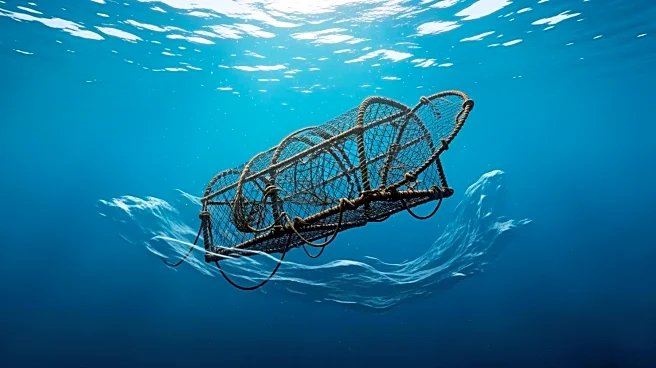What's Happening?
The Atlantic States Marine Fisheries Commission has reported a significant decline in the lobster population off New England, leading to a declaration of overfishing. Since 2018, the lobster stock has decreased
by 34% in key fishing areas, prompting concerns about future management measures that may restrict lobster fishing. Lobsters are a vital part of the U.S. seafood industry, valued at over $700 million last year. The decline is particularly noted in areas off Maine and Massachusetts, where most lobster fishing occurs. Despite previous attempts to enforce new rules to curb the decline, such as increasing the minimal harvest size, these measures faced resistance from fishermen. The industry is also challenged by potential new regulations to protect rare whales, warming oceans, and volatile trade markets.
Why It's Important?
The declaration of overfishing has significant implications for the U.S. seafood industry, particularly in Maine, where lobster fishing is a major economic activity. The potential restrictions on lobster fishing could impact thousands of families reliant on this industry. The situation underscores the need for sustainable fishing practices and effective management to balance economic interests with conservation efforts. The resistance from fishermen highlights the tension between regulatory measures and the livelihoods of those in the industry. Additionally, the challenges posed by environmental changes and trade dynamics further complicate the future of lobster fishing in New England.
What's Next?
Regulators may consider implementing new management measures to address the overfishing issue, potentially leading to stricter rules for lobster fishermen. The Maine Department of Marine Resources plans to engage with the industry to discuss the stock assessment and future strategies. Fishermen and industry stakeholders are likely to continue advocating for their interests, emphasizing sustainable practices and conservation efforts. The ongoing dialogue between regulators and the fishing community will be crucial in determining the path forward for the lobster industry in New England.
Beyond the Headlines
The situation raises broader questions about the sustainability of seafood industries and the impact of environmental changes on marine life. The decline in lobster populations may reflect larger ecological shifts, necessitating a reevaluation of fishing practices and conservation strategies. The industry's response to regulatory measures also highlights the cultural and economic significance of lobster fishing in New England, where it is deeply intertwined with local traditions and community identities.










